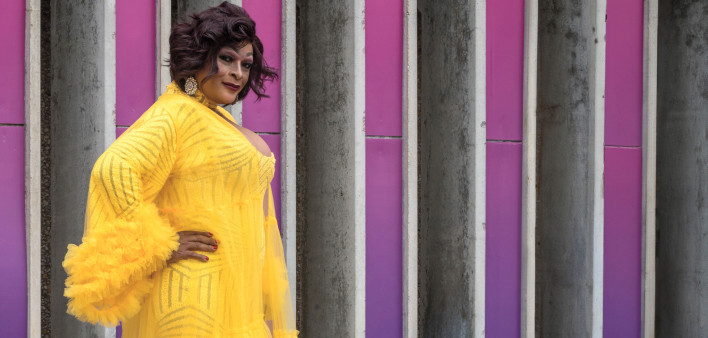“I’m not ashamed.” Those are the first words Jerry Van Hook tells POZ. The phrase is more than an anthem. The words also describe his approach to HIV.
One of the most venerable drag performers in Washington, DC, Van Hook, 59, is part of a long tradition of LGBTQ people using art to change the world. In this case, his alter ego, Shi-Queeta Lee, uses drag to entertain and delight.
Van Hook, who tested HIV positive in his mid-30s while briefly experiencing homelessness and engaging in survival sex, also weaves a gentle message of tolerance into his performances, a message aimed squarely at ending HIV stigma.
“The main struggle I had was taking so many pills every day,” Van Hook says, invoking an era when a typical daily regimen might have included numerous pills. “These were big-ass horse pills.”
So for a while, Van Hook quit taking his HIV medications. But stopping his meds while burning the candle at both ends nearly cost him his life.
“I was due to perform at Howard University, the first drag queen to perform at the Howard Theatre since the 1960s,” Van Hook says. “I was trying to get everything set up, building props and all that stuff. And I collapsed that morning of the show.”
Van Hook was taken to the hospital, where he was pronounced dead. He was resuscitated only after multiple vigorous interventions and spent two months in the hospital.
“I have a second chance at life,” Van Hook adds. “I went home with a better outlook. Drag has helped me overcome a lot of the stuff I’ve been through and helped me realize what I can do with my life.”
It’s not uncommon for people living with HIV to forgo their meds, he notes. For anyone who struggles to swallow pills of any kind, he recommends taking them with applesauce.
It’s also worth noting that long-acting injectable treatment is now a viable option for many people living with HIV.
Van Hook’s health has been stable since 2009, the same year he began performing at the legendary nightspot Town Danceboutique, the brainchild of Ed Bailey, whose tenure as DC’s queer nightlife impresario dates back to the peak days of the AIDS epidemic.
“For years, Jerry has been a role model for a younger generation of drag queens and for young people in general in our community,” Bailey says. “He has set a standard of responsibly doing his job and always showing up for the community. And to have done this in the face of all the challenges that he has faced is so remarkable. I am constantly in awe of his perseverance.”
Shi-Queeta is in hot demand these days, especially during Pride season. She kicked off this year’s celebrations with a halftime performance at Howard University’s women’s basketball Pride game.
“I feel like I have a purpose in life, and that’s to prove to myself and everybody else around me that just because I’m living with this virus doesn’t mean I’m not capable of still being a talented individual.”







Comments
Comments